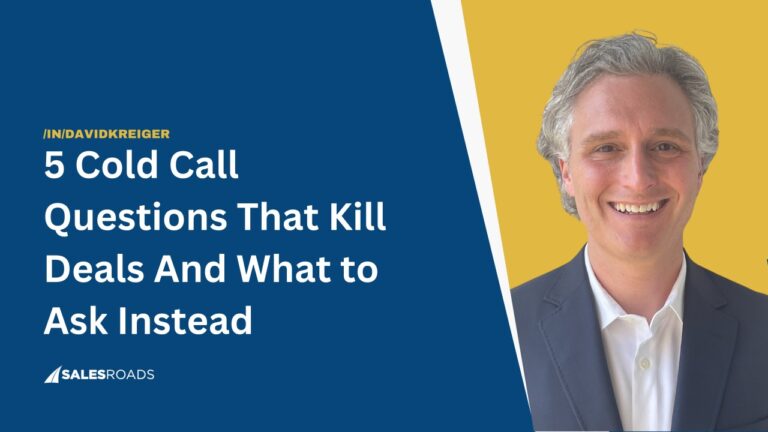British psychologist Ian Leslie once shared this nugget of wisdom: Good conversations start with good questions.
When sales reps cold call prospects, the goal is to have a productive chat, and asking the right questions can significantly further that aim. Well-crafted questions turn sales conversations into friendly dialogue and can yield more fruitful results.
Types of Cold Calling Questions
Sales reps use three types of questions in cold calls: open-ended, closed-ended, and probing. Open-ended questions invite detailed responses, shedding light on a prospect’s situation. Closed-ended questions seek concise yes-or-no answers for clarity. Probing questions, meanwhile, dig deeper to uncover underlying motives and insights.
| Close-Ended | Open-Ended | Probing | |
| Answer format | Limited choices, Yes/No | Elaborative, detailed | Varies, depends on previous response |
| Data type | Quantitative | Qualitative | Varies |
| Purpose | Gather specific data | Gain deeper understanding | Clarify, expand on existing information |
Open-ended questions are preferred for cold calls since they invite comprehensive responses and encourage rapport. However, close-ended and probing questioning are also strong complementary assets.
Striking the right balance between these types of questions drives successful cold calls.
If you ask too many closed-ended questions, the conversation can feel robotic, and you limit the chance for potential clients to share valuable insights. Too many open-ended questions, on the other hand, can make the conversation sound ambiguous. Inundating a cold call with excessive probing questions can also derail the conversational rhythm and obstruct the cultivation of trust and rapport.
Josh Amishav, CEO of Breachsense, recommends adapting the mix of open-ended, closed-ended, and probing questions according to the interaction’s phase and the call’s goals. He suggests beginning with open-ended questions to grasp a client’s challenges and objectives, then gradually incorporating closed-ended and probing questions to confirm specifics and guide the conversation toward desired outcomes.
Initial Questions to Ask on the Phone
Questions asked at the beginning of a call gather foundational information about the potential client, establish rapport, and uncover possible objections that may come up later in the conversation. The insights they reveal allow the sales rep to personalize their approach, producing custom outreach strategies for each lead. These questions serve to warm up the cold call and set the tone for the rest of the conversation.
Here are a few examples of effective opening inquiries:
Ask who’s in charge
“Hi [prospect name], I’m [your name] from [company]. Could you tell me who manages [department] at [prospect company]?”
At first glance, this might seem like an abrupt conversation starter. However, this approach helps you obtain the information you need right off the bat. If you’re speaking to the person in charge, it provides a foundation for the rest of your conversation. If not, this question can guide you to the right contact for your outreach and save you time.
Ask what they know about your company
“Can you tell me what you know about [your company]?”
“Have you heard about us before? If so, what have you heard?”
These questions gauge the potential customer’s familiarity with your company and what you offer. Their level of knowledge should determine how to frame your conversation: Are you introducing your company for the first time or expanding on what they already know?
It’s an easy way to tailor your approach to each prospect and establish your footing from the start.
Ask why they engaged with your company
“Could you share why you decided to engage with our company?”
This is a helpful question for inbound leads who’ve already had some interaction with your business, such as through social media or your website. If they’ve used a particular feature or downloaded content from your site, asking for their motivation can offer valuable insight into their needs.
Ask about their well-being

“How’ve you been?”
According to a Gong.io study, cold calls that open with the above line enjoy 6.6 times more success than those that skip this friendly opener. Checking in on a prospect’s well-being adds a personal touch and shows you care about them as an individual, not simply a potential client. Affirming this, Johannes Larsson, Founder and CEO of Financer.com, says:
“Asking about their well-being displays empathy and a readiness to engage in meaningful discourse. This approach can help build trust and credibility, which will make the prospect more open to hearing your value proposition.”
Ask about a recent social post
“I noticed your recent post about [subject/topic] on [social media platform]. Could you tell me a bit more about that?”
Referencing a recent social post not only shows you’ve done your homework but also that you’re genuinely interested in their thoughts and experiences. It’s a great way to build rapport and kick-start a meaningful conversation.
Ask about work and career updates
“Congratulations on your [promotion/new career development]. How has the transition been for you?”
Acknowledging and discussing your prospect’s recent career updates, such as promotions, new positions, or industry changes, is excellent for encouraging the lead to open up. It demonstrates your interest in their professional development and creates an opportunity to explore potential areas of alignment between their career trajectory and your business.
Ask about their challenges
“What are some of the challenges you’re currently facing in your role, particularly regarding [your product/service]?”
By inquiring about the specific challenges they encounter in their job that relate to your area of expertise, you can gain valuable insights into their pain points. This question demonstrates your understanding and willingness to address their unique needs, fostering a more meaningful conversation.
Questions for Qualification/Engagement on the Phone
Qualifying your prospects on a cold call involves checking if your product fits their needs. Your questions should also identify whether they can afford what you’re offering and how quickly they need to make a purchase.
That’s why qualifying questions are the most important for cold calls, so give them the attention they deserve.
Ask about their current processes
“Tell me about your current process.”
This question helps you spot the areas where your product can make a real difference for the prospect’s business. Their answer gives you an idea of which competitor they’re working with and the services required to keep your potential customer happy.
Ask for other decision-makers
“Should anyone else join us on this call, or maybe the next one?”
“Who else should we include in our next conversation?”
Reps can ask this question midway through the conversation to find out who else might have a say in the decision-making process. This is vital to carry key stakeholders along and for effective follow-up.
Ask for their ideal solution
“What would the ideal [product or service] do for you?”
Asking this gives a sense of what the prospect really wants from your offering. It unearths the features that are important to them, how they measure success, and the value they expect from your product or service.
Ask for their purchasing timeline
“How long will it take for us to reach a deal?”
Gauge the prospect’s buying timeline to learn how soon they’ll make a deal, so you can plan an effective follow-up strategy. Keep in mind that the larger the company, the longer and more complex the decision-making process and buying cycles.
Ask if your offering is a priority
“Is [product or service] something you need now?”
Your product or service might be exactly what a company needs, but they may not be ready to buy, and that’s fine; your goal is to stay on their radar so they’ll think of you once they are. If the prospect doesn’t consider your product an immediate priority, you can nurture them until they make the decision.
Questions for Handling Objections on the Phone
Objections are a typical part of sales, especially cold calls. Prospects will inevitably voice concerns, doubts, or uncertainties about your product or service, particularly if your call is their first introduction.
Consider employing the following questions to help you navigate these objections:
Ask for the major concern with your product
“Can you help me understand your concerns about working with us?”
“What is the major risk involved in working with us?”
Sometimes, a prospect’s objections are quick brush-offs without much thought behind them. If a lead is holding back, you need to understand why so you can handle the concern.
Ask to compare your offering with other solutions
“How does our product compare with other solutions you’re considering?”
This is a great way to see what might be missing from your offering and why the prospect is unconvinced. By comparing yours with others the client is looking at, you gain valuable insights into your product’s strengths and weaknesses and identify potential opportunities and risks. Ultimately, it guides you in refining your offering and strategically positioning it to surpass your competitors.
Clear any doubts and uncertainties
“Is there something about our company or product that you’re unsure about?”
“Is there any area that you need more information on?”
Sometimes, prospects have objections because they’re unsure of something or have questions that you haven’t addressed yet. B2B deals can be a big investment, so companies want to feel confident about the value they’ll receive.
Understand the source of the objection
“Can you share why you feel this way?”
The key to handling objections during a cold call is understanding where the prospect is coming from. Questions like this can get to the bottom of their hesitation and provide insights that inform your resolution strategy.
Propose a demo
“Many of our clients made a decision after seeing [product] in action. I can schedule a [product demonstration/free trial] in the coming days. When is a good time for you?”
“I can set up a meeting with my colleague to run you through the product. When can we meet you?”
Many decision-makers need to see a product or service in action before they commit. A sales demonstration, presentation, or free trial could be all they need to be convinced of your value.
Bottom Line
Asking well-crafted questions helps you learn about the prospect and fosters engaging conversations.
The President of SalesRoads, David Kreiger says,
“Are you asking because you really want to learn more? If you aren’t asking to learn about the prospect, then it’s part of a script. Great questions stem from curiosity, not from a list of ready-made questions you can rattle off on a call.”
For best results, research your lead and keep your inquiries relevant to their business. Then, pay close attention to their responses and be curious.
Mastering effective questioning in cold calls takes practice and dedication. As a sales rep, you can learn something from each call and incorporate that feedback to refine your approach. Every conversation is an opportunity to perfect your skills for more successful cold calls.










